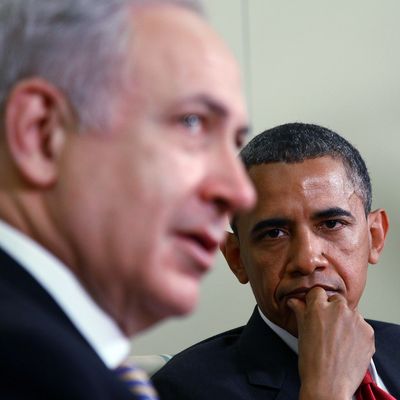
Yesterday, on the eve of the Israeli election, the reporter and essayist Jeffrey Goldberg published a long cover story in The Atlantic, asking, “Is It Time for the Jews to Leave Europe?” Goldberg’s diagnosis of continental anti-Semitism was grim and disturbing: The French interior ministry, for instance, reports that more than half that country’s hate crimes are directed against the tiny population of French Jews. But more than that, what Goldberg discerned was a continental disinterest in pluralism, an undergirding illiberalism that Islamic migration had begun to expose. The Atlantic appended to the story a video conversation between Goldberg and the influential critic Leon Wieseltier; both men seemed to agree that the hope for a liberal Europe had collapsed, perhaps recently, perhaps long ago. “There is no such thing as the West,” Wieseltier said, “there is the American west and the European west,” in which one coast of the Atlantic (ours) is truly comfortable with pluralism and the other (theirs) is not. Then Wieseltier and Goldberg both excoriated European leaders for failing to craft a social policy that might, in any meaningful way, help those who live in Islamic immigrant ghettos. “In Europe you go back to this problem of the other,” Wieseltier said. “There’s the native and the foreigner.”
Goldberg and Wieseltier sit at the same table within the cafeteria of American liberalism — a disputatious table, admittedly, but still, they aren’t exactly representative figures. Even so, the changes they describe are real, and seem to confirm a quiet turn that has taken place throughout the Obama era, as Europe has come to seem an uglier place under economic and social stress: The continent is no longer a subject of liberal pining and aspiration. We’ve fallen out of love with Europe.
Israel has a way of making the matter more poignant and fraught, and so it was interesting when yesterday, with the election there drawing to a close, Paul Krugman turned his attention to the “disturbing transformation” in Israel’s “income distribution and society,” in which a putatively prosperous place had returned almost all of its gains to a tiny oligarchy, while the share of Israel’s population in poverty had doubled and the portion of its children who are poor has quadrupled. Krugman is the great public social Democrat, but his writing on Europe since the financial crisis has often emphasized the economic brutality of the austerity policies Europe’s (mostly) right of center politicians have adopted, and the social and political ruptures that have come as a consequence. In Netanyahu’s speech to Congress, Krugman located the spirit of his great villain in a new politician, halfway around the world: “Mr Netanyahu tried to change the subject from internal inequality to external threats, a tactic those who remember the Bush years should find completely familiar.”
Europe and Israel have — at different times and for different people — been examples of alternative ways in which American society might be arranged, if it were less individualistic, more communal. But after the news of the past few weeks, and in many ways the past decade, these dreams for Europe and Israel have rarely looked more like a fantasy than they do now. America and Europe seem to be moving in different directions. Obama has for most of his presidency been an ideologically isolated figure. Conservative politicians have held power in most of America’s closest political allies: David Cameron, Angela Merkel, Benjamin Netanyahu, Stephen Harper, and Felipe Calderón. (France has been a mix of left and right, but it is hard to see any Obama-ists in there.) The gap between the social safety net in Europe and the United States, often understood as an inextricably cultural phenomenon, looks somewhat narrower now, with the push toward universal health-care coverage, and could soon look narrower still, if the next election gives us a second Clinton in the White House and the expansion of, for instance, universal pre-K. For the first decade of the 21st century, many American liberals longed for Scandinavia or Canada and fantasized about acts of political migration. But now the prime minister of Canada says, “a great evil has been descending over our world,” and the lone rabbi in Malmo, Sweden, reports that he can’t exit his synagogue without being spit upon. Last month, The New Yorker considered the fantasy of Nordic egalitarianism and concluded that “the rise of both anti-immigration sentiment and wealth inequality” suggest Scandinavia may not be so great after all.
Today, for a fleeting moment, liberals may find something improbably hopeful in Israel, where the center-left coalition looks stronger and more inclusive than it has recently and Netanyahu’s increasingly radical hyperbole suggests lousy internal polls. But I suspect that the real subject of liberal idealism will soon, once again, be America. In a subterranean way, this may be helping to strengthen the current spasms of anxiety over a Hillary Clinton candidacy. David Remnick this week accused Clinton of “a notably transparent exploitation of gender” in her botched answers to the questions over her maintenance of a private email server, and there was a heartfelt clamor for a more authentically liberal figure like Al Gore. Which isn’t to say that there aren’t plenty of good domestic reasons for progressives to look askance at Hilary Clinton. But the matter of the Democratic presidential primary bears just a little more stress and weight if you believe that America, for all its limitations, is what liberals have got.





























